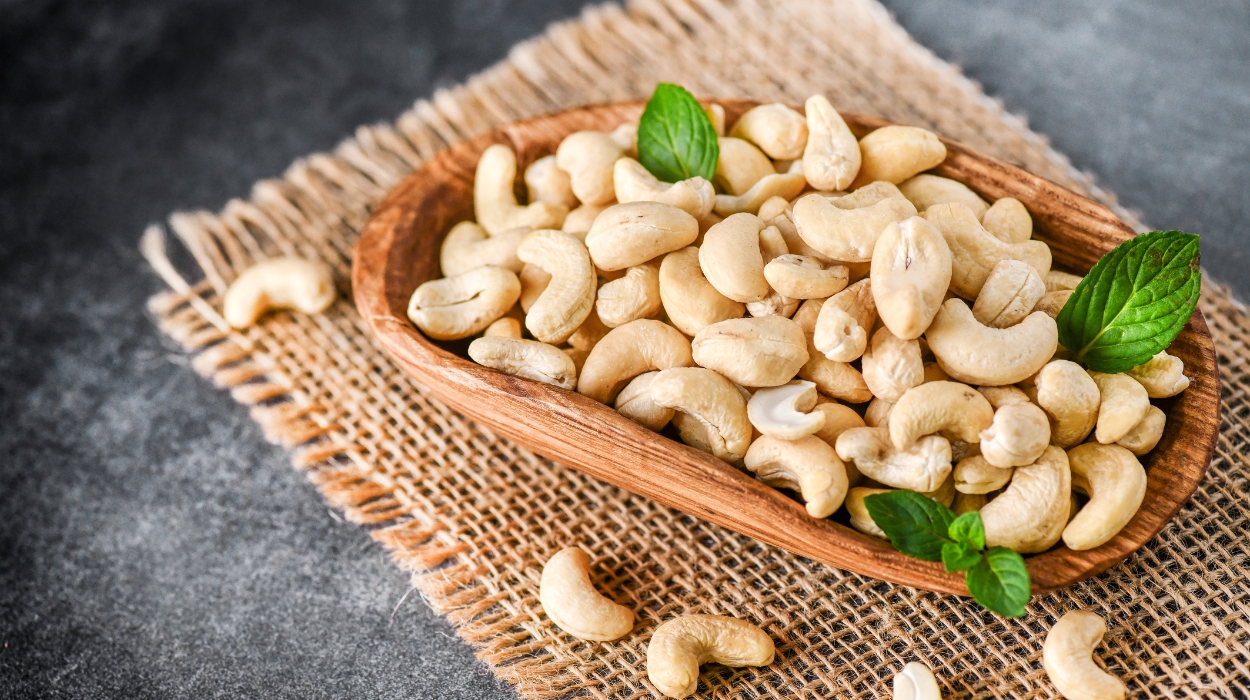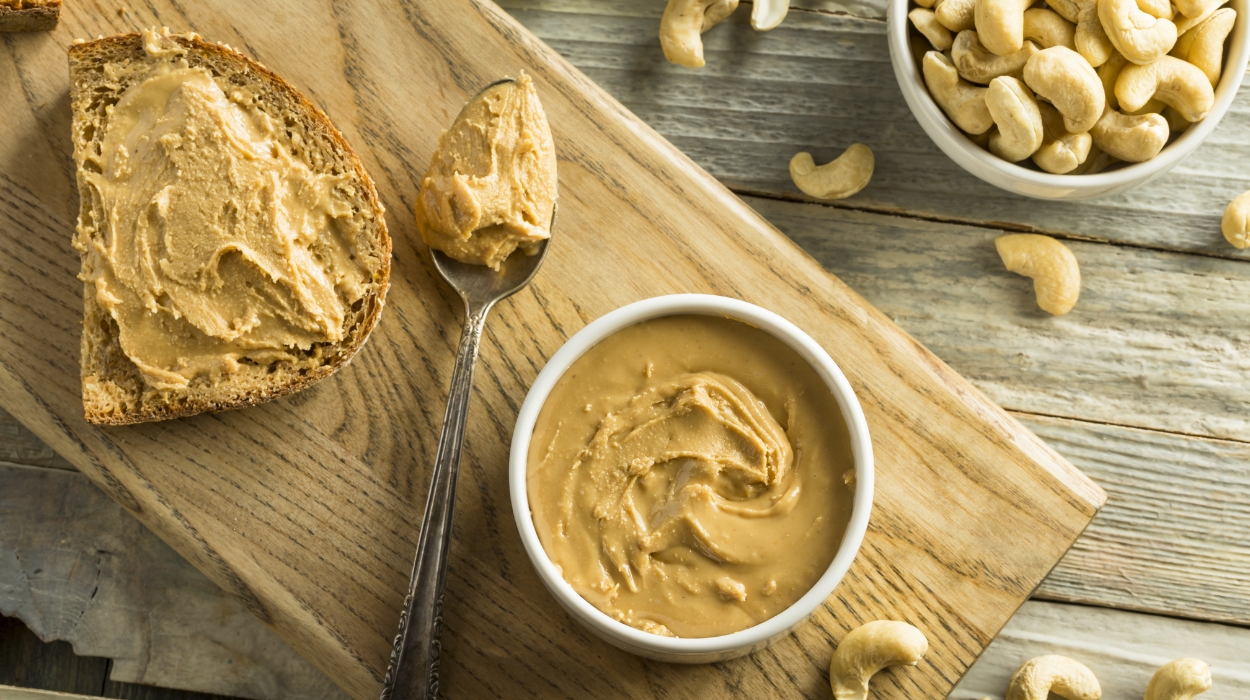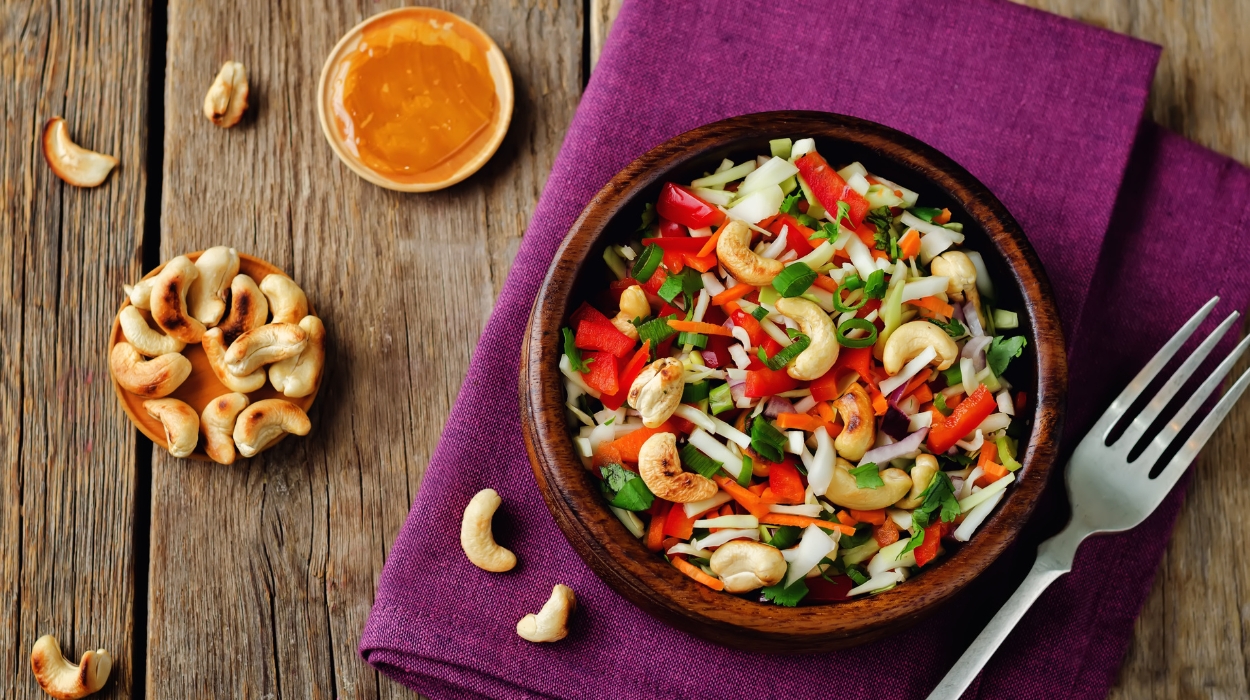 Expert's opinion
Expert's opinion
Expert's opinion
The article is a subjective view on this topic written by writers specializing in medical writing.
It may reflect on a personal journey surrounding struggles with an illness or medical condition, involve product comparisons, diet considerations, or other health-related opinions.
Although the view is entirely that of the writer, it is based on academic experiences and scientific research they have conducted; it is fact-checked by a team of degreed medical experts, and validated by sources attached to the article.
The numbers in parenthesis (1,2,3) will take you to clickable links to related scientific papers.
Are Cashews Good For You? Health Benefits, Nutrition, Diet & Risks In 2024

The cashew is technically not a tree nut. The correct label is a drupe, a fruit with inside “flesh” and an outside shell that cover a seed inside. The cashew tree is a tropical tree of which cashews are the seeds of the cashew “apple.” It is known as caju in several languages, which basically means “nut that produces itself.”
People eat cashews for their health benefits, as they are an excellent plant-based, healthy fat and protein source. But are cashews good for your stomach, your skin, your heart, or weight loss? Are salted/unsalted, roasted, or raw cashews good for you? And how do you consume them? Let’s examine this in detail.
5 Impressive Health Benefits Of Cashews
Are eating cashews good for you? Here are the five best benefits of cashews for your health.
- Control appetite
- Promote heart health
- Lower blood pressure
- Gain weight safely
- Improve brain health
Cashews Benefits: Are Cashews Good For You?
Control Appetite
Nut consumption[1] may promote satiety, especially in overweight and obese adults who have struggled with appetite control. Healthy fats are important in maintaining blood sugar control. Nuts can stabilize blood sugar and insulin levels. A comprehensive review and meta-analysis[2] showed that nuts have a low-risk score for diabetes development compared to other food groups. This study analyzed prospective studies, considered the most reliable type of study.
This suggests that nuts in snacks may benefit overweight and obese individuals. Thus, cashews can be included in weight loss diets because it is a source of healthy fats that have the power to reduce appetite.
Promote Heart Health
Eating cashews helps to prevent cardiovascular disease. The blood cholesterol-lowering effect is the major factor in the cashew that promotes heart health.
LDL (“bad” cholesterol) levels, the major cause of heart and vascular disease can be reduced by cashews and other tree-nut consumption. Cashews and other nuts contain unsaturated fats that help the balance between the “bad cholesterol” and the “good cholesterol (HDL) favorably. Interestingly, the nut type isn’t as important as the amount of nut consumption; nevertheless, the cashew is in the group.
In the meta-analysis[3], which investigated all nut consumption, including cashews, daily nut intake may regulate blood lipids and lowers total cholesterol, LDL-cholesterol, apolipoprotein B, and triglycerides, all players in atherosclerosis[4].
A randomized controlled study[5] of 51 healthy men and women showed that cashew consumption in a typical American diet with a normal carbohydrate, protein, and fat distribution (i.e., 54% carbohydrate, 18% protein, and 29% fat) lowered the blood total and LDL-cholesterol levels. HDL-cholesterol levels, however, were unaffected.
Plant-based diets[6] have been found to lower cardiovascular risks like LDL-cholesterol. Nuts such as cashews are important food choices for plant-based diets. Although a higher HDL and a lower Lowering LDL-cholesterol is the most effective combination strategy to reduce heart disease, doing either one is still extremely helpful.
Lower Blood Pressure
The National Health Service (NHS) of the United Kingdom indicated that high blood pressure levels (hypertension)[7] increase risks for coronary heart disease risk and stroke events.
A meta-analysis[8] of 392 participants showed that cashew nut consumption significantly reduced the systolic blood pressure level compared to the controls.
Gain Weight Safely
Healthy weight gain is a big concern for many skinny people because people want to gain weight without increasing their metabolic parameters, blood lipids, or inflammatory responses.
This is where nuts come into play. Eating cashews can be a good way to get daily calories in weight gain diets without any concerns. As mentioned before, cashews have healthy fats and protein that come with the calories. It is also easy to take them with you during the day as a healthy and nutritious snack.
Improve Brain Health
Eating nuts was found to be beneficial for brain health, thanks to their healthy fatty acid composition which has a role in healthy nerves.
A comprehensive meta-analysis[9] examined nut intake, including cashews’ role, on cognitive performance. The data obtained from 22 studies with 43,793 individuals showed that nut consumption contributed to reducing dementia risk and the maintenance of cognitive functions throughout life.
Many dietary protocols used for neurodegenerative disease prevention, such as the Mediterranean diet, DASH diet (the Dietary Approaches to Stop Hypertension), and the MIND diet (Mediterranean-DASH Intervention for Neurodegenerative Delay) diets, demonstrate that nut consumption is a common feature.
This is because they have a beneficial fatty acid profile and are rich in fiber, B vitamins, minerals, and antioxidant compounds. The healthy fatty acids cashews contain can improve skin health, protecting skin cell walls like neuron cells.
Nutrition Facts
Nutritional value of 1 serving of cashews (1 oz = 28.35 grams):
- 165 calories
- 14 grams total fat (18%): Mono-unsaturated fatty acids 7.86 grams, polyunsaturated fatty acids 2.5 grams
- 9 grams total carbohydrate (3%)
- 4.2 grams protein (8%)
- 0.8 grams dietary fiber (3%)
- 1.54 milligrams (mg) zinc (14%)
- 71.44 mg magnesium (17%)
- 1.7 mg iron (9%)
- 155 mg potassium (3%)
- 0.61 mg copper (68%)
- 3.2 micrograms selenium (6%)
How Many Cashews Do You Consume In One Serving?
1 serving of cashews is generally accepted as 28 g (1 oz), which contains 18 whole cashews.
Are Cashews Bad For You?
Although cashews contain a healthy oil seed, they may not be beneficial for you if some concerns are not considered:
Allergic Reactions
So, why might cashews be bad for you? The reason is the specific proteins in cashews that your body thinks are harmful and react. If so, when you eat cashews, you may get irritated, your skin reactions start, and maybe even your breathing is affected.
Nut allergies center on the food group to which many people are allergic. Cashews are a potent allergenic food[10] capable of triggering several immune reactions. If you are allergic to cashews and accidentally consume part or the whole of one, the reaction can be severe enough to require epinephrine treatment and hospitalization.
The prevalence of cashew nut allergies is rising daily because the commercial consumption of this nut is increasing.
If you have a cashew allergy, you should eliminate cashews and tree nut-containing foods from your diet, because allergic reactions can be as severe as those of peanut allergies, i.e., anaphylaxis[11]. You must also be wary of nut exposure contaminating foods during production. Check food labels before buying them, or it may be prudent–if you don’t trust the labeling–to simply not consume that particular brand, food, or meal.
Also, even if you don’t have an allergic reaction to cashews, you may feel discomfort in your digestive system due to their high-fat content if you consume a lot of them.
As nutritious as raw cashews are, they may pose danger in some cases because of their shell. Cashew shells might have toxins similar to poison ivy, and anyone allergic to cashews or poison ivy may have a cross-reactivity[12] that causes the same itchy and inflamed skin. Roasting cashews can eliminate the shell toxins, so it might be better to consume roasted cashews if you have such an experience.
Unwanted Weight Gain
Nuts have good nutrients and can be consumed as a healthy calorie source. However, it can be easy to lose control while eating nuts as a snack. To prevent weight gain, portion control is essential.
Aflatoxin Risk
Aflatoxins are harmful toxins produced by fungi (mycotoxins). This toxicity can lead to liver damage. Cashews, like other nuts and foods, are a risk for aflatoxins.
According to The Food and Agriculture Organization of the United Nations (FAO)[13], 25% of food might have a potential risk of contamination by toxins and mycotoxins. It is an important problem for both human health and the food industry.
To eliminate the mycotoxin risk, the bigger food brands should be preferred because they have appropriate quality control, production integrity, and storage capacity. Cashews and other nuts should be stored in dry and cool places to avoid fungi growth.
Salted Cashews Can’t Help
Are salted cashews good for you? Salted cashews may not be good for you if you have hypertension, cardiovascular, or kidney problems. Too much salt can be used during cashew production, so cashews can worsen your blood pressure and other health problems, such as edema or kidney problems.
How Do You Add Cashews To Diet?
There are many ways to add cashews to diets and it can be a good choice for weight loss. The nuts can be consumed as a healthy snack and are also suitable food for you if you follow a gluten-free, low-carb diet, plant-based, high-fat, or ketogenic diet.
But you can not use cashews in elimination diets because these kinds of diets aim to reduce potential allergic foods. Also, cashews are not a good choice for lectin-free diets as it has a high level of lectin.
Snacks
You can find many things you are looking for in a healthy snack in cashews, like for other nut seeds. A hearty and healthy snack that appeals to your taste buds, combined with dried or fresh fruits, is a great possibility for a snack.
Cashew Butter and Milk

Is cashew butter and milk good for you? Cashew butter can be a nut butter alternative to use in cereals and snacks with fruit.
Also, cashew milk is an alternative for those who can’t consume dairy products due to lactose or casein intolerance, or a vegan lifestyle.
Sauces
Cashews can be found in many good sauces at restaurants. If you’re allergic, ask when ordering to make sure your menu choice doesn’t contain cashews. Otherwise, enjoy, and you can also add cashews to salads and the pasta sauces you make at home. It is a sought-after ingredient, especially for pesto sauces.
Salads

Like walnuts, cashew has become a popular nut we add to many salads. You can try adding cashews to flavor and diversify your salads.
Shakes
Cashews go well with many shakes you make with cashew fruits (juices), milk, and yogurt. If you’re an athlete, do bodybuilding, or are trying to close your calorie deficit, it’s a good idea to add cashews to your protein shakes.
The Bottom Line
Cashews are an important nut for heart health, appetite, blood sugar control, and brain health; they also are a good source of healthy fats to support skin and cellular integrity.
However, some proteins in their chemical structure can easily cause allergies. There are many people in the world who are allergic to cashews. Unfortunately, for those who feel they don’t, a tree nut allergy can begin at any time in life.
Storage conditions are also important in order not to destroy the benefits of cashews. Therefore, specifying and labeling foods containing cashews is extremely important. Conscious consumption (mindful eating) is necessary so that negative effects do not happen or can be responsibly noted by the consumer in the future.
+ 13 sources
Health Canal avoids using tertiary references. We have strict sourcing guidelines and rely on peer-reviewed studies, academic researches from medical associations and institutions. To ensure the accuracy of articles in Health Canal, you can read more about the editorial process here
- Tan, S.Y., Dhillon, J. and Mattes, R.D. (2014). A review of the effects of nuts on appetite, food intake, metabolism, and body weight. The American Journal of Clinical Nutrition, [online] 100(suppl_1), pp.412S422S. doi:10.3945/ajcn.113.071456.
- Schwingshackl, L., Hoffmann, G., Lampousi, A.-M., Knüppel, S., Iqbal, K., Schwedhelm, C., Bechthold, A., Schlesinger, S. and Boeing, H. (2017). Food groups and risk of type 2 diabetes mellitus: a systematic review and meta-analysis of prospective studies. European Journal of Epidemiology, [online] 32(5), pp.363–375. doi:10.1007/s10654-017-0246-y.
- Del Gobbo, L.C., Falk, M.C., Feldman, R., Lewis, K. and Mozaffarian, D. (2015). Effects of tree nuts on blood lipids, apolipoproteins, and blood pressure: systematic review, meta-analysis, and dose-response of 61 controlled intervention trials. The American Journal of Clinical Nutrition, [online] 102(6), pp.1347–1356. doi:10.3945/ajcn.115.110965.
- Björkegren, J.L.M. and Lusis, A.J. (2022). Atherosclerosis: Recent developments. Cell, [online] 185(10), pp.1630–1645. doi:10.1016/j.cell.2022.04.004.
- Mah, E., Schulz, J.A., Kaden, V.N., Lawless, A.L., Rotor, J., Mantilla, L.B. and Liska, D.J. (2017). Cashew consumption reduces total and LDL cholesterol: a randomized, crossover, controlled-feeding trial. The American Journal of Clinical Nutrition, [online] 105(5), pp.1070–1078. doi:10.3945/ajcn.116.150037.
- Trautwein, E.A. and McKay, S. (2020). The Role of Specific Components of a Plant-Based Diet in Management of Dyslipidemia and the Impact on Cardiovascular Risk. Nutrients, [online] 12(9), p.2671. doi:10.3390/nu12092671.
- National Health Service (2019). Overview – High Blood Pressure (hypertension). [online] NHS. Available at: https://www.nhs.uk/conditions/high-blood-pressure-hypertension/.
- Jalali, M., Karamizadeh, M., Ferns, G.A., Zare, M., Moosavian, S.P. and Akbarzadeh, M. (2020). The effects of cashew nut intake on lipid profile and blood pressure: A systematic review and meta-analysis of randomized controlled trials. Complementary Therapies in Medicine, [online] 50, p.102387. doi:10.1016/j.ctim.2020.102387.
- Theodore, L.E., Kellow, N.J., McNeil, E.A., Close, E.O., Coad, E.G. and Cardoso, B.R. (2020). Nut Consumption for Cognitive Performance: A Systematic Review. Advances in Nutrition, [online] 12(3), pp.777–792. doi:10.1093/advances/nmaa153.
- Mendes, C., Costa, J., Vicente, A.A., Oliveira, M.B.P.P. and Mafra, I. (2016). Cashew Nut Allergy: Clinical Relevance and Allergen Characterisation. Clinical Reviews in Allergy & Immunology, [online] 57(1), pp.1–22. doi:10.1007/s12016-016-8580-5.
- Midun, E., Radulovic, S., Brough, H. and Caubet, J.-C. (2021). Recent advances in the management of nut allergy. World Allergy Organization Journal, [online] 14(1), p.100491. doi:10.1016/j.waojou.2020.100491.
- Anon, (2022). Dermatitis Associated with Cashew Nut Consumption — Pennsylvania. [online] Available at: https://www.cdc.gov/mmwr/preview/mmwrhtml/00001269.htm
- Fao.org. (2022). Mycotoxins of world-wide Importance. [online] Available at: https://www.fao.org/3/Y1390E/y1390e04.htm



